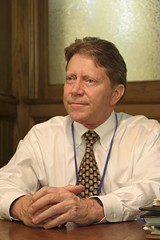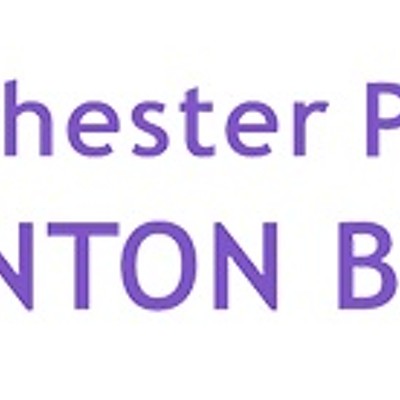[
{
"name": "500x250 Ad",
"insertPoint": "5",
"component": "15667920",
"parentWrapperClass": "",
"requiredCountToDisplay": "1"
}
]
For years, Tim Mains has lobbied for legislation to end poisoning from lead-based paint in the city of Rochester.
Finally, last Tuesday, inside a packed chamber, Mains, a 20-year Council veteran and a city school principal, got his wish. During its last meeting of the year and Mains' final session as a Council member, City Council unanimously approved mandatory inspections for lead-paint hazards in Rochester's poorest neighborhoods.
And to Mains' and many others' surprise, Council also agreed to the tougher examination Mains had sought: inspectors will use dust wipes rather than just visually checking for flaking or deteriorated paint. Under the new legislation, houses that pass an initial visual inspection will then get dust-wipe checks. The dust-wipe legislation targets rental housing in specific city blocks where county health department data indicates that 90 percent of all lead poisoning is occurring.
Many in the Council audience who had lobbied for dust wipes applauded, and Mains' said later: "This really is the best Christmas present that I could give to the children in my school."
It has been an emotional battle for Mains. Studies indicate that each year hundreds of Rochester children are poisoned by lead-based paint. The paint was outlawed in 1978, but it is still present in older houses, of which Rochester has many. The poisoning causes brain damage and other serious problems in very young children.
"I don't think it's an accident that the person on Council who has been invested in moving this forward and the person on Council who has spent the most time learning about it is me," Mains said in a phone interview late last week. "I'm the one person who has personal experience with this."
Council's often-heated dispute reflected a split over how to balance children's health against the city's finances. With the city's budget already strained, some Councilmembers pressed for visual inspections, arguing that dust wipes could cost hundreds of thousands of dollars. The projected cost per unit for dust wipes is $40. But because nobody knows how many houses will pass the initial visual inspection and will need the tougher review, it's impossible to estimate what the legislation will cost the city.
Mains says that going into last Tuesday's meeting, he assumed that some level of lead legislation would pass --- but he didn't think it would be his proposal. He was confident of only three votes, he said: his, Brian Curran's, and Adam McFadden's. Councilmember Wade Norwood, he thought, had six votes for visual inspections.
Councilmembers first rejected a proposal that would have mandated dust wipes throughout the city. President Lois Giess and Norwood said the measure would place undue strain both on the city and on landlords, who would have to pay for the remediation. Giess argued that because it is impossible for inspectors to ascertain the source of airborne lead particles, landlords would be punished for cleanup costs that may not have originated in their unit.
But Mains worried that visual inspections wouldn't detect all lead-paint hazards, particularly lead-paint dust. And he said he was afraid that landlords untrained in lead-safe cleanup practices would try to save money by repairing apartments themselves so they could pass the visual inspection. Improperly sanding and scrubbing lead-paint surfaces could exacerbate existing lead problems, he said.
By 10 o'clock, the meeting had been in session for three hours, and audience members fell into an uneasy silence. Curran offered a final proposal, mandating dust wipes only in county-specified high-risk areas.
"In the last four years, [the number of] children whose lives I have seen, whose lives have been ruined by this disease, is unconscionable," Mains said, choking up.
Previously silent, Councilmember Ben Douglas seemed almost to debate with himself. "The devil has always been in the details. Can we put forth legislation that will actually be implemented?" he asked. "We had discussions about a targeted lead-wipe option in high-risk areas, and if the target can be done in an affordable way, I'm prepared to support this amendment."
It was apparently a pivotal moment. Giess joined Douglas: "I'm willing to support this particular amendment," she said, "because I suspect that most of the properties in those areas will fail the initial inspection." If that's the case, dust wipes won't be necessary in many properties. If inspectors see visible signs of deteriorated lead-based paint, they'll have to remove it or adequately cover it.
"Ben stepped up and broke the logjam," Mains said later. "He was my last hope."
Looking forward, Mains hopes that the city will eventually be able to phase out dust wipes altogether. "If you're finding overwhelmingly that dust wipes are coming back clean, then you don't have to use them anymore," he said.
Will this be the silver bullet that solves the city's problems with crime and education, though? That's unlikely. There are multiple ways that poverty impedes academic success, Mains concedes. But he, like many, hopes that the legislation will give hundreds of children at least a fighting chance at success.
Speaking of Lead Law, City Council
-

Rochester activists renew call for eviction protections
Jul 22, 2021 -

City Council President Loretta Scott: vaccine misinformation dangerous
Dec 18, 2020 -

Calendar preview: Out in color
Jun 24, 2020 - More »
Latest in News
More by Sujata Gupta
-

Bridging the racial divide
Nov 15, 2006 -

Home grown
Sep 27, 2006 -

Hiking: Happy trails
Sep 20, 2006 - More »






